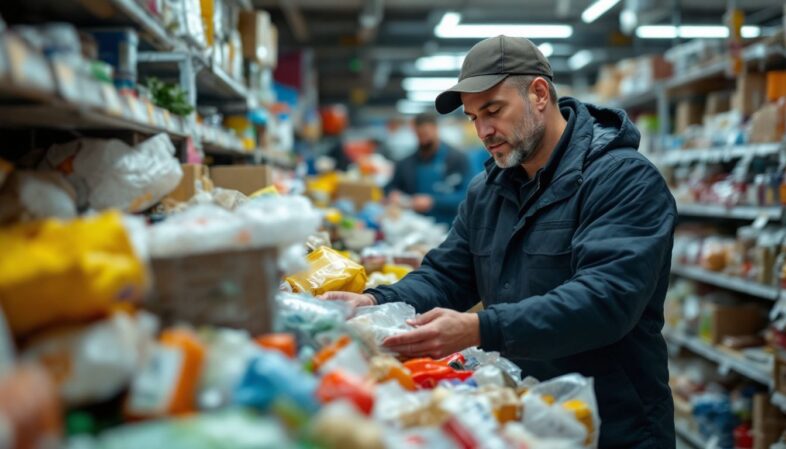Waste management in retail stores is a growing challenge. Shops deal with piles of rubbish each day—from food waste to packaging and single-use plastics. Without proper planning, this waste can harm the environment and damage a shop’s reputation.
Did you know that UK retail produces 280,000 tonnes of food waste yearly? Add to this the mountains of paper, plastic, and cardboard—landfills are filling up faster than ever.
This blog will share simple strategies to reduce waste. From audits to eco-friendly packaging tips, you'll learn how retailers can make smarter decisions for sustainability. Keep reading…
there’s a lot your store can save!
Key Takeaways for Waste Management In Retail Stores
- UK retail generates 280,000 tonnes of food waste yearly and over 1.1 million metric tonnes of total waste, with packaging and plastics being major contributors. Recycling rates for cardboard are 85%, but only 9% of global plastics are recycled.
- Food waste makes up 40% of the UK's food disposal from retail. Offering discounts on short-dated items or using just-in-time inventory reduces surplus stock and landfill emissions like methane.
- Retailers can adopt strategies like waste audits, donation programmes, and reusable packaging to minimise impact. For instance, supermarkets like Aldi use compostable packaging to cut plastic reliance.
- Partnering with sustainable companies simplifies waste management. Businesses achieve goals by recycling e-waste properly or donating unsold clothes and electronics instead of discarding them.
- Dr Lara Bennett stresses ethical actions such as zero-waste policies and eco-friendly practices while highlighting challenges like initial investment costs for smaller stores. Long-term benefits include cost savings and stronger customer loyalty.
Common Types of Waste in Retail Stores

Retail stores generate different kinds of waste every day. These waste types can harm the environment if not managed properly.

Packaging Waste
Packaging waste is a significant issue in the retail sector. Shops produce vast amounts of cardboard, plastic, and other materials. Over 500,000 tonnes of cardboard are discarded every year.
Businesses are also accountable for generating 1.1 million metric tonnes of overall waste annually in the UK alone.
Choosing recyclable packaging can significantly address this challenge. Regulations since 1997 require businesses to lower packaging volume and adopt recyclable options. Many supermarkets now opt for biodegradable packaging and reusable bags instead of traditional plastic ones.
For example, Aldi has shifted to sustainable options like compostable packaging.
Cardboard recycling rates are at an impressive 85%. Yet only 9% of all plastics produced globally are recycled—a concerning statistic for managers aiming to reduce waste. Prioritising closed-loop practices ensures less material is incinerated or disposed of in landfills while enhancing environmental benefits.
Food Waste
Food waste constitutes 40% of the UK’s total food disposal from retail and food services. Retail stores discard approximately 200,000 tonnes annually, significantly impacting the environment.
Decomposing food in landfills emits methane gas, which contributes more severely to global warming than carbon dioxide. Throwing away edible products also squanders water, energy, and agricultural resources.
Providing discounts on near-expiry items can alleviate this issue. Customers typically pay 36% less for items expiring in two to three days and 60% less when only 24 hours remain. Overstocking is another major cause of waste.
Implementing just-in-time (JIT) inventory strategies helps prevent unnecessary surplus stock and reduces costs.
Recycling unused food through anaerobic digestion is another effective measure for supporting a circular economy. This process produces biogas or fertiliser instead of landfill waste, leading to a reduction in overall pollution levels!
Plastic and Glass Waste
Plastic and glass waste pose big challenges for retail stores. UK retailers generate over 800,000 tonnes of plastic waste each year. Plastic recycling can save energy—one bottle alone powers a 60W bulb for six hours.
Glass recycling involves sorting, crushing, and heating to create new products. Both processes reduce the need for raw materials and cut carbon emissions.
Encourage customers to use reusable shopping bags instead of plastic ones. The plastic bag charge reduced usage by more than 95%. Partner with suppliers offering sustainable packaging options or recyclable materials like glass jars.
Proper recycling bins in your store can also help manage these wastes efficiently while supporting circular economies.
Textile and Electronic Waste
Retail stores produce significant amounts of textile and electronic waste. In 2020, the EU generated approximately 6.95 million tonnes of textile waste, with an alarming 300,000 tonnes of clothing ending up in landfills each year.
Only 12% of textile waste in Europe is recovered for suitable recycling or reusing processes. Retailers must act swiftly to ease this environmental challenge by considering innovative reuse strategies like donating unsold goods or encouraging reused items through customer-focused initiatives.
Electronic waste is another growing concern, with WEEE (Waste Electrical and Electronic Equipment) regulations urging businesses to adopt sustainable disposal methods. Annually, around 1.45 million tonnes of e-waste are generated globally; yet only about 17% is recycled correctly.
Adhering to Extended Producer Responsibility (EPR) laws can assist retailers in managing discarded electronics while reducing their carbon footprint—an essential step for fostering sustainable operations as part of larger recycling efforts.
Sustainable Strategies for Waste Management
Smart waste strategies can save money and reduce harm to the planet—learn key methods that retail stores can apply today for a cleaner future.

Conducting Waste Audits
Waste audits help retail stores reduce waste and save money. They also identify where waste comes from and how to manage it better.
- Start by tracking all types of waste, like packaging materials, food waste, and paper waste. Keep records of quantities over a set time.
- Sort the waste into categories such as recyclables, plastic bags, food items, or textile scraps. This makes data easy to analyse.
- Measure the amount of each type of waste using scales or other tools. Numbers give accurate results for planning changes.
- Look for patterns in disposal habits, like excess carrier bags or wasted stock from poor inventory management. These show opportunities to reduce waste.
- Engage staff to spot waste issues in daily tasks—frontline workers often see problems managers might miss.
- Use findings to improve processes like adopting reusable packaging or creative reuse systems for outdated items.
- Identify valuable recyclables like cardboard or glass and sell them in bulk using a baler for extra income.
- Highlight surprises in your audit, such as unused energy-saving options in supply chains or recyclable materials wrongly sent to landfills.
- Partner with sustainable companies that handle complex materials efficiently instead of relying on standard refuse services.
- Set goals based on the audit results—for example: zero-waste targets or cutting landfill trips by 50% within a year.
Waste audits can uncover hidden savings while enhancing corporate social responsibility efforts!
Implementing Recycling and Reuse Programmes
Implementing recycling and reuse programmes can cut costs and reduce waste in retail outlets. These steps help create a sustainable business while lowering environmental impact.
- Set up bins for recyclable waste like paper, cardboard, glass, and plastics. Label them clearly to avoid confusion among staff and customers.
- Train employees on sorting methods for effective waste reduction. This improves logistics and saves time during disposal processes.
- Reuse materials where possible—like using returned packaging for future shipments or storage within the warehouse.
- Partner with local facilities that handle recyclable waste efficiently to ensure proper degradation of collected items. Focus on reducing expenses tied to improper disposal methods.
- Introduce take-back schemes for customers to return used products, such as electronics or textiles, which can be repurposed or recycled.
- Work with suppliers to reduce unnecessary waste packaging in shipped goods—this aligns purchasing practices with zero-waste strategies.
- Use food waste depackaging machines to separate organic and inorganic elements, making it easier to recycle components into compost or soil enrichers.
- Promote reusable shopping bags by selling branded ones—the step reduces single-use plastic dependency while enhancing customer loyalty.
- Monitor progress through regular sustainability audits linked to your business strategy goals like achieving net-zero targets.
Proper programme execution supports circular economy practices… leading seamlessly into donating unsold goods as a next approach!
Donating Unsold Goods
Recycling and reuse cut waste, but unsold goods often still pile up. Donating them prevents wasting resources while helping communities in need. Retail companies can give food to local food banks or donate clothes and electronics to charities.
This reduces retail waste, supports circularity and promotes an environmentally friendly image.
Setting SMART goals for donations makes the process clear and measurable. Companies must engage stakeholders like staff and partners to develop strong donation strategies. Public statements or reports showcasing these efforts build trust with customers—boosting brand loyalty while reducing waste disposal costs.
Giving unsold items a second life benefits businesses and people alike.
Partnering with Sustainable Waste Management Companies

Working with sustainable waste management companies can simplify waste reduction. Some providers, like Business Waste, offer free bins, delivery services, and nationwide UK coverage.
They help manage various retail waste types—packing materials or e-waste included. Retailers also gain access to certified recycling partners for safe disposal of electronic devices.
These partnerships improve efficiency while supporting eco-friendly goals. Shops can even set up e-waste drop-off points for customers. In the past 7 days alone, 16,831 collections were completed across the UK.
Partnering saves time and aligns your store with sustainability efforts… boosting both energy savings and customer trust!
Net Zero Targets, Decarbonisation and Sustainability Audits
Setting net-zero targets aligns closely with effective waste-reduction strategies. The UK aims to achieve net-zero greenhouse gas emissions by 2050. Retail stores can help reach this goal by rethinking waste management and embracing a circular model.
Landfills accounted for 70% of the waste sector's emissions in 2021, mainly from food and packaging decay. Cutting landfill reliance directly lowers carbon footprints.
Sustainability audits are essential tools for tracking progress. These audits measure resource use, recycling rates, and emissions tied to operations like transport or disposal processes.
They also highlight gaps where decarbonisation efforts could improve efficiency or reduce costs. Metrics based on environmental impact ensure that solutions are practical and measurable—helping retail managers meet zero-waste goals while saving over time through optimised investments in green technology or partnerships with recyclers and composters.
Conclusion to this Article About Waste Management In Retail Stores
Efficient waste management in retail is essential. It minimises landfill impact and supports sustainability.
Dr Lara Bennett, an environmental scientist with over 20 years of experience, offers her expertise. She earned a PhD in Sustainable Retail Strategies from Oxford University. Her contributions have influenced various policies on eco-friendly business practices.
Dr Bennett explains that practices such as waste audits and recycling programmes lead to significant improvements. These approaches reduce costs, decrease carbon footprints, and optimise store operations.
She highlights the UK’s progress in separating recyclables as a move towards greater transparency.
She emphasises that ethical actions are crucial too—like donating unsold goods instead of discarding them. Clear objectives for achieving zero waste should align with both government regulations and consumer demands.
For shop owners, she suggests straightforward steps such as first-in, first-out stock rotation to minimise food waste or offering digital receipts instead of printed ones. Collaborating with reliable eco-friendly companies can also simplify transitional challenges.
Dr Bennett acknowledges some obstacles: initial investments in tools or training may seem significant for smaller stores. Nonetheless, these efforts yield long-term benefits through cost savings and enhanced customer loyalty.
Her concluding message? With thoughtful planning and decisive action today—retailers can champion sustainability in the future!
FAQs for our Title: Waste Management In Retail Stores
1. What is zero waste, and how can retail stores achieve it?
Zero waste means reducing waste to the minimum by reusing, recycling, and managing resources sustainably. Retail stores can adopt strategies like first-in, first-out inventory systems to reduce expired or unsellable products.
2. How can social media help in promoting sustainable practices in retail?
Social media allows retailers to share their sustainability efforts with customers. It’s a great platform to promote recycling programmes and educate consumers about zero-waste initiatives.
3. Why is the first-in, first-out method important for waste management?
The first-in, first-out method ensures older stock gets sold before newer items are displayed. This reduces spoilage and supports more sustainable inventory management.
4. Can recycling alone make retail operations sustainable?
Recycling helps but isn’t enough on its own. Retailers need broader strategies—like reducing packaging waste, embracing circularity principles, and using resources responsibly—to operate sustainably.
Waste Management In Retail Stores – References
- https://www.theretailbulletin.com/retail-commentary/sustainable-retail-packaging-guide-07-08-2024/
- https://www.wastemanaged.co.uk/our-news/retail/retail-waste-guide/
- https://www.sciencedirect.com/science/article/pii/S2352550923002567
- https://www.sciencedirect.com/science/article/pii/S235255092200152X
- https://www.eea.europa.eu/publications/management-of-used-and-waste-textiles (2024-05-21)
- https://trellis.net/article/awesome-opportunity-auditing-retail-waste/
- https://www.linkedin.com/pulse/enhancing-business-sustainability-through-effective-waste-behrendt-pwcvf
- https://www.circularise.com/blogs/r-strategies-for-a-circular-economy
- https://howtohigg.org/brm-user-selection/brm-question-by-question-guidance/environment/environment-waste/
- https://www.sciencedirect.com/science/article/pii/S2352550920314433
- https://united.group/circularity-and-waste-management/
- https://www.resourcify.com/guide/recycling-circularity-retail-guide
- https://link.springer.com/article/10.1007/s10163-024-02003-8
- https://www.cisl.cam.ac.uk/system/files/documents/net-zero-a-strategic-framework-for-business-action.pdf







